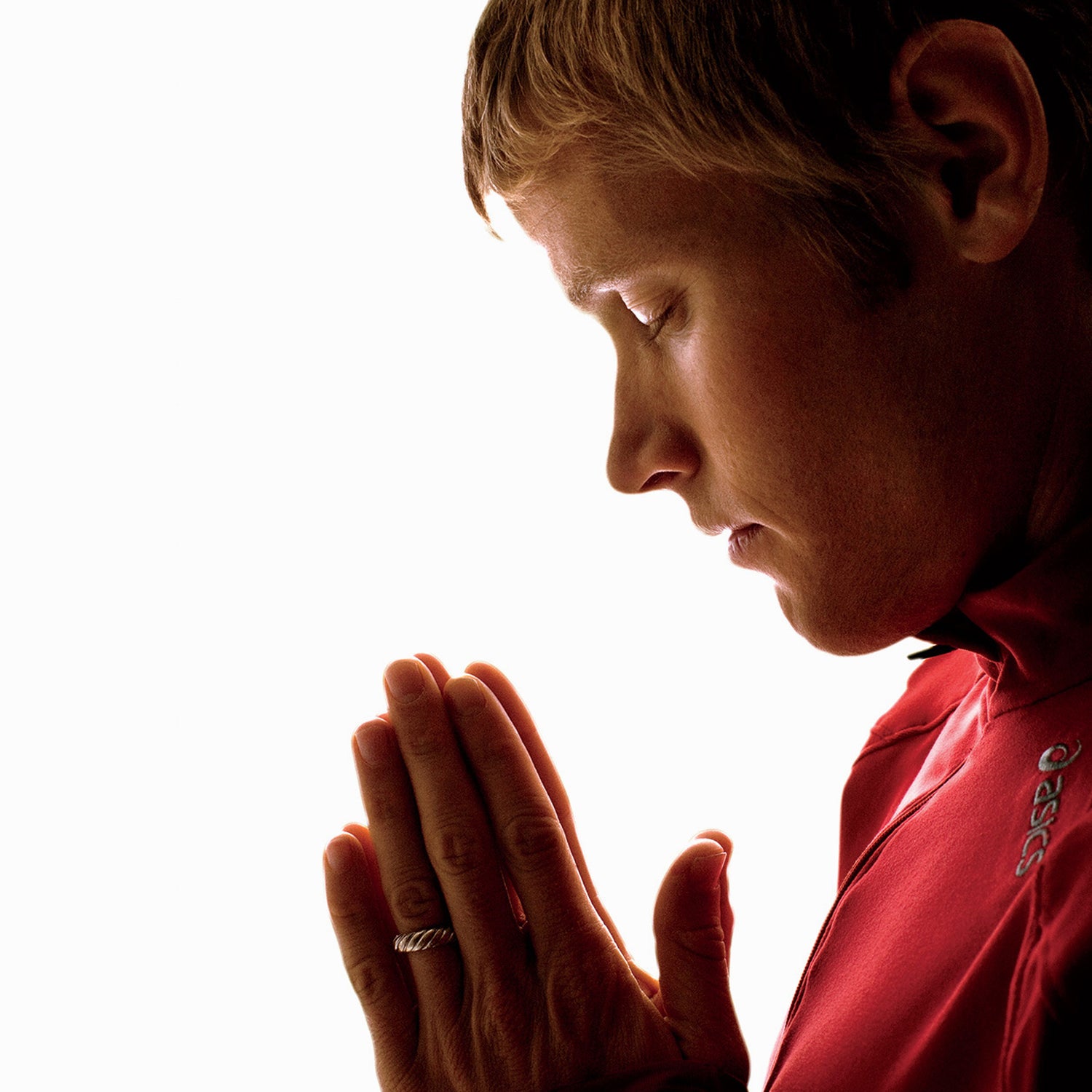Before the side cramp hit and he started to panic, felt like he was running better than he ever had in his life. It was mile ten of the 2007 Houston half marathon, and he was in first place, averaging 4:30 per mile.
Hall didn’t typically suffer from cramps, so when he felt one coming on, he ignored it and kept pushing. But the discomfort persisted, then got worse. Panic took hold.
So Hall prayed. He was direct: Lord, please help me get to the finish line without my stomach blowing up. He focused and repeated it again to himself. A minute later the pain was gone, and Hall went on to and at the time the fastest half marathon ever run by a non-African. Remembering that day and the pain he experienced, Hall says, “T���re’s definitely power in prayer.”
Of course, for Hall to point to prayer as a performance enhancer isn’t exactly surprising—he’s known as much for his Christian faith as for being one of America’s most gifted distance runners. And anyone familiar with professional sports has witnessed the pregame bowing of heads and postgame shout-outs to God. Skeptics might dismiss it as religious posturing, but science is revealing that prayer works. When believers pray, something happens in their brains that actually makes them better athletes.
, director of research at Thomas Jefferson University Hospital’s Marcus Institute of Integrative Health, has spent a large portion of his career studying the effects of religious faith on our mental hardware. “When you pray, it changes your brain,” he says.
In his research, Newberg found that prayer allowed his subjects to more quickly and efficiently achieve flow, that coveted state of mind most commonly described as being “in the zone.” During flow, a cascade of neurochemicals descend into the brain, including dopamine (which regulates pleasure), serotonin (which reduces stress), and norepinephrine (which activates the fight-or-flight response). The brain also undergoes electrical changes.
Skeptics might dismiss it as religious posturing, but prayer works. When believers pray, something happens in their brains that actually makes them better athletes.
Scientists are able to measure brain waves via an electroencephalogram, or EEG, and have found that the measurements change based on what a person is doing and how they’re feeling. Most of the time, the brain produces beta frequencies (13 to 30 hertz), which help with complex thought and critical analysis. You’d expect an athlete’s brain to be less active during strenuous effort, and if they’re performing well—in a state of flow—the brain is indeed calmer, dominated by alpha waves (8 to 12 hertz). In this condition, we become relaxed and instinct driven. Brain activity is largely quiet, especially in the frontal lobe and cerebrum, where our notion of the future and our sense of self are concentrated. And prayer, it turns out, is one of the best ways to achieve this state, perhaps even more so than mindfulness training.
“T��� is really more of a secular approach,” says Newberg, who is a former professor of religious studies at the University of Pennsylvania and the author of . “We sort of cleaned it up and secularized it so that it’s more available to everyone, which is good. But in many ways it isn’t as good or as powerful as prayer.”
For two decades, Newberg has looked at the cerebral blood flow of believers—from Muslims to evangelical Christians—while they prayed and has observed a pattern. When the subjects begin, there is activity in the frontal lobe. Then, after anywhere from 10 to 50 minutes, that area goes virtually silent. Additional research has shown that during prayer, the frontal lobe is flooded with alpha waves. It’s the same result brought on by mindfulness and meditation, but adding in belief, Newberg says, can act as a powerful catalyst. When someone truly believes in something, he says, it gives them a sense of purpose. It’s not simply a means to an end. “When I’m praying to God while I’m competing,” Hall says, “I feel much more grounded, much more secure, much more free—I feel liberated.”
According to Newberg, all this boils down to something that sounds almost too simple. “T��� more you buy into whatever you’re doing, the better the effect is going to be,” he says. “If you’re a religious person and your religion is important to you, then being able to engage in prayer can be extremely valuable.” It’s less about believing in the right thing—Jesus, Allah, or the Flying Spaghetti monster—than it is about believing in something. In other words, whatever you focus on, have total faith in it.
Take for instance what Hall experienced in 2009 while he was running the final stretch of the Philadelphia half marathon. He was on pace with the leaders when he felt himself starting to fade around mile 11. He asked, OK, God. What do you have for me? Hall says that a Bible verse then came to mind—Proverbs 23:7, “As a man thinketh in his heart, so is he,” variations of which are commonly found in self-help and mindfulness books. Hall says, “I remember declaring to myself, Even though I feel tired, I do have strength left inside me. I do have another gear. I can go deeper.”
He accelerated, ran the final mile in 4:30, and .


